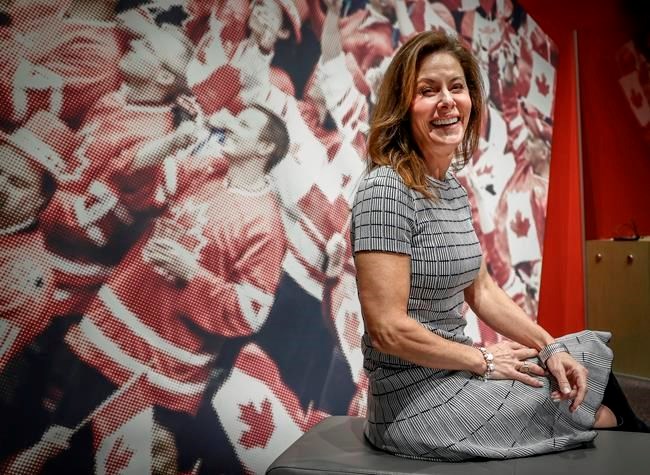CALGARY — Canada's Sports Hall of Fame has completed a seismic shift from bricks and mortar in Calgary to a hybrid involving a museum in Ottawa and an emphasis on digital storytelling
From Wayne Gretzky to Georges St. Pierre to Clara Hughes to thoroughbred Northern Dancer, no other institution dedicated to Canadian sports history covers the same breadth of sports and artifacts as Canada's Sports Hall of Fame.
The Order of Sport induction class of 2023, for example, included figure skaters, a mixed martial artist, a curling team, an Indigenous softball player, a judo coach and an Indigenous lacrosse pioneer.
When Olympic curler Cheryl Bernard was recruited and hired as president and chief executive officer in 2018, she told the board the Hall's model wasn't sustainable.
Her opinion was provocative because after six years without a physical home, the Hall at Calgary's Canada Olympic Park had just opened in 2011 for $30 million in federal, provincial and municipal money.
The 4,200-square-metre foot building, which closed to the public in 2020 during the COVID-19 pandemic and never reopened, is for sale.
"My proposal to the board was 'this is not engaging enough Canadians and it's not engaging Canadians that really have no connection to sport, so how do we do that?'" Bernard told The Canadian Press.
"The struggles were real. They were seeing 40,000 people a year in the building. We're a national museum of sport and we were not seeing enough people. We were not connecting with enough youth.
"What I proposed to the board was 'the building is actually hampering our reach across the country, so would you be agreeable that we sell the building and use those funds to really expand our digital reach?' My promise to them was we'll reach millions and not thousands."
The Hall's 100,000 objects and 60,000 archival records were acquired by the Canadian Museum of History in Ottawa — the largest single acquisition in that museum's history — with a $5-million assist from the federal government's 2021 budget to execute the move.
The Hall's 2023 induction ceremony was held at the Museum of History in October.
A selection of sport artifacts is on display in the museum's special exhibitions corridor until October of next year.
There's also a 1988 Winter Olympic Games exhibit of stories, art, and videos in the Calgary Tower's lobby until next summer.
The major change in the Hall's strategy, however, is an emphasis on telling sport stories digitally with schools across Canada a primary target.
Canada's Sports Hall of Fame isn't alone in altering its business model. New York's Museum of Modern Art (MOMA) auctioned off $70 million in art this year to fund the expansion of its digital reach.
"I think the number right now is 50 per cent of museums will fail in the next 10 years," Bernard said. "It's the way of the world that kids aren't wandering through museums as much anymore. You need to bring it to them."
She says 250,000 children in schools across Canada will have seen Sports Hall of Fame digital programming by the end of 2023. The goal for 2024 is 400,000.
She says the Hall's "Indigenous Sports Heroes" education module has received almost a million hits on its website.
"There's activities and curriculum alignments that the teachers have access to on the platform. It's all done for them," Bernard explained.
"The activities that come from it, that's the key of inspiring youth to understand inclusion or inspiring them to want to try sport or even providing Indigenous role models for classrooms across the country."
The Canadian Museum of History in Ottawa has the financial and expert resources to preserve artifacts and facilitate off-site exhibitions, Bernard said.
"As a non-museum person, I nearly fell over when I came to the Hall and started to understand the cost behind the physical exhibit," she said.
"We had 100,000 of these artifacts sitting in storage at the Hall and then we had just 10 per cent on display. We could not afford to ship them across the country to different museums to the extent that the Canadian Museum of History will do.
"Museums from across the country will apply for the collection. They'll say, 'can we have all the Terry Fox artifacts?' and they'll ship them there. So our artifacts will be seen."
This report by The Canadian Press was first published Dec. 7, 2023.
Donna Spencer, The Canadian Press



